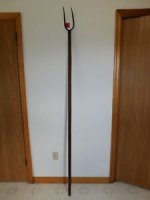At the same time, quarterstaff fighting uses two hands. Is it ever grasped with one hand? Sure. But are there any examples of people historically using a staff and shield?
Did people really use a spear and shield and routinely strike with the blunt and end of the spear? Without a shield sure you could bludgeon a close in ally if you are using two hands.
I like one of the ideas put forth earlier—-the d4 is a shield bash.
Why does any of it matter at all? I guess it all depends on how much grounding you like in your game of magic and elves. I like some. When there is none and option are taken that seem to betray the fiction in favor of a mechanical advantage, that is where I see cheese.
It’s just what you are into and willing to accept. In no way does it break the game to have people get polearm master benefits with a shield in use.
All of that said, the default game is without feats. In that context, sword and shield are mechanically superior to a two handed weapon much of the time. Especially with dueling style…




